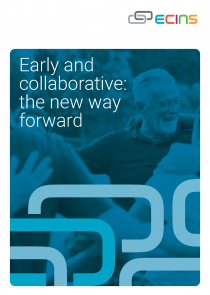Targeting a reduction in permanent exclusions
Peterborough, a region with a population of over 900,000 people, is recognised as one of the most deprived areas in England, with significantly reduced life expectancies and incomes compared to the national average. Given that education is positively correlated to improved health outcomes and income, and Peterborough was tracking above average for school exclusions, it made sense that the Peterborough City Council, with the help of ECINS, would create a unique program dedicated to reducing the number of children expelled from school.
Taking complexity into account
The program they created was complex, because many of the most vulnerable and at-risk children had complex lives. Many of these children were on full child protection plans. Or living with family violence or family members with mental health issues or addictions. Some were unaccompanied minors from Syria, Iraq, Iran and Afghanistan. Many of these children had suffered extreme trauma in their young lives, which was often at the heart of the issues they faced at school.
Working together to achieve outstanding success
Despite these challenges, this program has changed the number of exclusions from one or two permanent exclusions every three weeks to two permanent exclusions in two years. The only program of its type nationally, the outstanding success of this model has seen it awarded the Office for Standards in Education, Children’s Services and Skills (Ofsted) model of excellence three times.
Ex-Police Officer, Andy Craighead, a key facillitator of the program, said, “ECINS has been absolutely central to the success of the scheme. It really is an amazing tool that has allowed us to carry out this work in a secure and efficient way and help us deliver joined-up support.”
The approach
“Every Friday we would get a call from a school saying that they didn’t know what to do with a specific child, that they had tried everything and that nothing was working. It became obvious that we needed a unique approach and one that promoted early intervention, rather than crisis management, to support these children, their families and their schools,” Andy said.
So what is the benefit of early intervention?
In a nutshell, early intervention is about identifying the different areas where a person is struggling and supporting them to deal with problems while they are small and manageable rather than waiting for them to grow. The benefits to society in this approach is enormous as evidence shows that the larger and more complicated the problem, the more difficult and costly to it is to manage. (If you are interested in finding out more about early intervention practices and benefits you can read more in our free-ebook, available for download at www.ecins.com).
In this instance, Peterborough’s early intervention approach involved a multi-disciplinary team of professionals, tasked as a group, to individually assess and ‘wrap support’ around a child and their family. There was also additional specialist support provided to children with additional needs.
The behavioural support panel
To ensure each individual received the help they needed, head of service, Claire George, set up a behavioural support panel that came together weekly. The panel included representatives such as:
- Peterborough City Council’s early help co-ordinator
- educational psychologists
- mental health nurses from Project for Schools
- staff members from Children and Adolescents Mental Health Service (CAMHS).
Easier collaboration and more efficient work practices on ECINS
This group would combine their areas of expertise to conduct an assessment of the child’s social, emotional, communication and behavioural needs. They would then create an action and support plan using the tools in the ECINS case management module. If specialist interventions were required, they could add these additional organisations to the ECINS system (at no additional cost) and share relevant information about the child directly from the master file, keeping anything that they didn’t have permission to see, safely locked away using our completely secure and flexible permission system.
Adding new data on-the-go
During these meetings, and then when they returned to their offices, each of these organisations would log onto and input into the same individual case on the ECINS system so they were able to quickly build a rich and complex understanding of the myriad of issues and supports in place for each child. And because ECINS is a not-for-profit organisation who is genuinely interested in changing society for the better, we don’t charge for additional licenses so even when the team expanded and grew, there was no additional cost for including them on the ECINS system.
(Why don’t we charge licences? Because vulnerable people are at the heart of our systems, collaborative work practices are proven to lead to better outcomes, and we work with a lot of charities who have limited resources. Our goal is always to make things easier for them and to provide a cost neutral system that pays for itself in time and efficiency savings.)
Family Involvement leads to successful outcomes
Claire said, “A key part of the success of the process is the involvement and engagement of the child’s family. Andy and myself would carry out a home visit on behalf of the child, including a detailed assessment of the family to consider their unique support needs. We would then allocate an intervention specialist worker so the family has a dedicated point of contact. From there we would arrange for any referrals for support required as a result of the assessment.
“It’s not just behavioural or emotional support that we can signpost to, we also offer support for issues such as drug and alcohol problems, rent arrears or mental health issues to the family unit as a whole.”
How the process works on ECINS from beginning to end
- A school sends an electronic referral form for an at-risk child through via the referral module
- Once an administrator approves the referral, the data from this referral is automatically transferred to the case management module with no additional need for data entry
- If other family members are already on ECINS, they are connected to this case to create a wider family context for issues
- After initial consultation, home visit forms are uploaded onto the system
- Actions and tasks are assigned to the individuals involved in the behavioural support panel e.g. requesting mental health nurse to conduct an assessment and deliver a neurodevelopmental report
- Once individual has completed their assigned task new data is uploaded onto the ECINS file
- Access to new information is granted only to relevant parties
- Family support worker is tasked automatically to ensure family is constantly updated as new information arises
- Because ECINS is a secure cloud-based system, the support worker is able to login remotely to get up-to-date information in real time and update the system whilst out on home visits
Why they chose ECINS
“We had a need for and a requirement to record the information we were receiving from schools and we needed to tie it all together with the professionals on our panel. We needed a secure system that could work across all the agencies – mental health (NHS}, local authority and schools and we also needed to give the Police access to information on occasions,” Andy said.
“As Cambridgeshire were already using ECINS for a range of solutions across the county, I fully understood the capabilities and benefits of the system and recognised it as being the ideal platform to fully meet a partnership approach.
“ECINS has allowed us to link the schools and the wider services to our day-to-day work in the behavioural support panel and involve all the agencies that need to be involved.”
The reduction in numbers of permanent exclusions from one or two permanent exclusions every three weeks to two permanent exclusions in two years, speaks volumes. We are delighted to be working with Peterborough in making a difference to the education, health and wellbeing of not just at-risk children, but of their families too.


